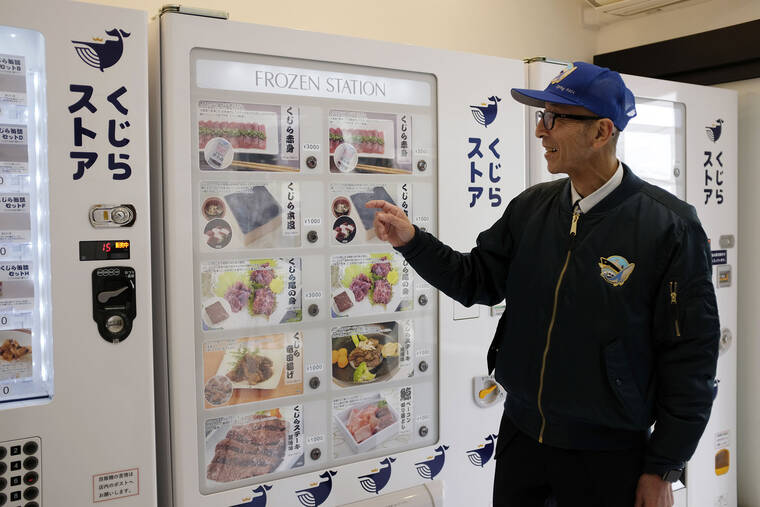Japan firm opens whale meat vending machines to push sales
YOKOHAMA, Japan — A Japanese whaling operator, after struggling for years to promote its products amid protests from conservationists, has found a new way to cultivate clientele and bolster sales: whale meat vending machines.
The Kujira (Whale) Store, an unmanned outlet that recently opened in the port town of Yokohama near Tokyo, houses three machines for whale sashimi, whale bacon, whale skin and whale steak, as well as canned whale meat. Prices range from 1,000 yen ($7.70) to 3,000 yen ($23).
ADVERTISING
The outlet features white vending machines decorated with cartoon whales and is the third location to launch in the Japanese capital region. It opened Tuesday after two others were introduced in Tokyo earlier this year as part of Kyodo Senpaku Co.’s new sales drive.
Whale meat has long been a source of controversy but sales in the new vending machines have quietly gotten off to a good start, the operator says. Anti-whaling protests have subsided since Japan in 2019 terminated its much-criticized research hunts in the Antarctic and resumed commercial whaling off the Japanese coasts.
Conservationists say they are worried the move could be a step toward expanded whaling.
“The issue is not the vending machines themselves but what they may lead to,” said Nanami Kurasawa, head of the Iruka &Kujira (Dolphin &Whale) Action Network.
Kurasawa noted the whaling operator is already asking for additional catches and to expand whaling outside of the designated waters.
Kyodo Senpaku hopes to set up vending machines at 100 locations nationwide in five years, company spokesperson Konomu Kubo told The Associated Press. A fourth is to open in Osaka next month.
The idea is to open vending machines near supermarkets, where whale meat is usually unavailable, to cultivate demand, a task crucial for the industry’s survival.
Major supermarket chains have largely stayed away from whale meat to avoid protests by anti-whaling groups and remain cautious even though harassment from activists has subsided, Kubo said.
“As a result, many consumers who want to eat it cannot find or buy whale meat. We launched vending machines at unmanned stores for those people,” he said.
Company officials say sales at the two Tokyo outlets have been significantly higher than expected, keeping staff busy replenishing products.
At the store in the Motomachi district of Yokohama, a posh shopping area near Chinatown, 61-year-old customer Mami Kashiwabara went straight for whale bacon, her father’s favorite. To her disappointment it was sold out, and she settled for frozen onomi, tail meat that is regarded as a rare delicacy.
Kashiwabara says she is aware of the whaling controversy but that whale meat brings back her childhood memories of eating it at family dinners and school lunches.
“I don’t think it’s good to kill whales meaninglessly. But whale meat is part of Japanese food culture and we can respect the lives of whales by appreciating their meat,” Kashiwabara said. “I would be happy if I can eat it.”
Kashiwabara said she planned to share her purchase of a 3,000 yen ($23) handy-size chunk, neatly wrapped in a freezer bag, with her husband over sake.
The meat mostly comes from whales caught off Japan’s northeastern coast.
Japan resumed commercial whaling in July 2019 after withdrawing from the International Whaling Commission, ending 30 years of what it called research whaling, which had been criticized by conservationists as a cover for commercial hunts banned by the IWC in 1988.
Under its commercial whaling in the Japanese exclusive economic zone, Japan last year caught 270 whales, less than 80% of the quota and fewer than the number it once hunted in the Antarctic and the northwestern Pacific in its research program.
The decline occurred because fewer minke whales were found along the coast. Kurasawa says the reason for the smaller catch should be examined to see if it is linked to overhunting or climate change.
While conservation groups condemned the resumption of commercial whaling, some see it as a way to let the government’s embattled and expensive whaling program adapt to changing times and tastes.
In a show of determination to keep the whaling industry alive in the coming decades, Kyodo Senpaku will construct a 6 billion yen ($46 million) new mother ship for launch next year to replace the aging Nisshin Maru.
But uncertainty remains.
Whaling is losing support in other whaling nations such as Iceland, where only one whaler remains.
Whales may also be moving away from the Japanese coasts due to a scarcity of saury, a staple of their diet, and other fish possibly due to the impact of climate change, Kubo said.
Whaling in Japan involves only a few hundred people and one operator and accounted for less than 0.1% of total meat consumption in recent years, according to Fisheries Agency data.
Still, conservative governing lawmakers staunchly support commercial whaling and consumption of the meat as part of Japan’s cultural tradition.


